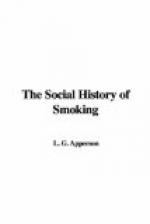Hogarth himself was a confirmed pipe-lover. When he and Thornhill and their three companions set out from Gravesend for the final stage, up the river, of their famous “Five Days Peregrination,” we are told that they hired a boat with clean straw, and laid in a bottle of wine, pipes, tobacco, and light, and so came merrily up the river. The arm-chair in which Hogarth was wont to sit and smoke is still preserved in his house at Chiswick, which has been bought and preserved as a memorial of the moralist-painter; and in the garden of the house may still be seen the remains of the mulberry tree under which Mr. Austin Dobson suggests that Hogarth and Fielding may have sat and smoked their pipes together in the days when George was King.
VIII
SMOKING UNFASHIONABLE (continued): LATER GEORGIAN DAYS
Says the Pipe to the Snuff-box,
I can’t understand
What the ladies
and gentlemen see in your face,
That you are in fashion all
over the land,
And I am so much
fallen into disgrace.
WILLIAM
COWPER.
(From a letter to the Rev.
John Newton, May 28, 1782.)
“Smoking has gone out,” said Johnson in talk at St. Andrews, one day in 1773. “To be sure,” he continued, “it is a shocking thing, blowing smoke out of our mouths into other people’s mouths, eyes and noses, and having the same thing done to us; yet I cannot account why a thing which requires so little exertion, and yet preserves the mind from total vacuity, should have gone out.” Johnson did not trouble himself to think of how much the vagaries of fashion account for stranger vicissitudes in manners and customs than the rise and fall of the smoking-habit; nor did he probably foresee how slowly but surely the taste for smoking, even in the circles most influenced by fashion, would revive. Boswell tells us that although the sage himself never smoked, yet he had a high opinion of the practice as a sedative influence; and Hawkins heard him say on one occasion that insanity had grown more frequent since smoking had gone out of fashion, which shows that even Johnson could fall a victim to the post hoc propter hoc fallacy.
More than one writer of recent days has absurdly misrepresented Johnson as a smoker. The author of a book on tobacco published a few years ago wrote—“Dr. Johnson smoked like a furnace”—a grotesquely untrue statement—and “all his friends, Goldsmith, Reynolds, Garrick, were his companions in tobacco-worship.” Reynolds, we know—
When they talk’d
of their Raphaels, Corregios, and stuff,
He shifted his trumpet, and
only took snuff.
Johnson and all his company took snuff, as every one in the fashionable world, and a great many others outside that charmed circle, did; but Johnson did not smoke, and I doubt whether any of the others did.




